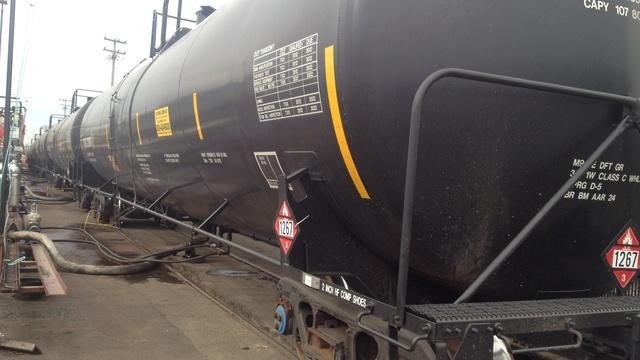
Tank cars carrying petroleum crude oil are stationed at a former asphalt plant near the Willamette River in Northwest Portland. The plant was recently purchased by Arc Logistics.
Tony Schick
Oregon's two U.S. senators, Ron Wyden and Jeff Merkley, on Friday urged the Department of Transportation to expand its call for greater transparency to include all shipments of crude oil, not just that produced in the Bakken region of North Dakota.
On Wednesday, the federal agency issued an emergency order for shipments over 1 million gallons, or roughly 35 tank cars, of Bakken crude requiring railroads provide notification to State Emergency Response Commissions about estimated volumes of crude being transported, the route, and the frequency of the anticipated weekly train traffic.
“We feel strongly that this emergency order could be strengthened and improved by including oil produced in – and transported from – other parts of North America, rather than limiting it to trains originating in the Bakken region,” the senators wrote in the letter.
The order's omission of Canadian crude and Utah crude, in particular, leaves information gaps for first responders in the Pacific Northwest.
Crude oil from Canada’s Tar Sands currently moves through Oregon and Washington on its way to refineries in California, which at the end of 2013 accepted a record 709,000 barrels of Canadian crude by rail. Crude oil from Utah also moves through Oregon, but its precise volumes and destinations are unknown.
The Oregon Department of Environmental Quality has said the heavy and waxy crude oils from Canada and Utah, while not as explosive as Bakken crude, are not well understood and would be expecially problematic to clean up if they spill.
Emergency responders, meanwhile, say advance notification by itself is not enough.
“The DOT’s new notification requirement is a positive step forward, but what’s most critical is that fire and rescue departments have the resources necessary to respond effectively to an oil spill incident,” Portland Fire and Rescue Chief Erin Janssens wrote via email Thursday. “Unfortunately, at this time we’re not equipped to respond to such volatile fuel.”
